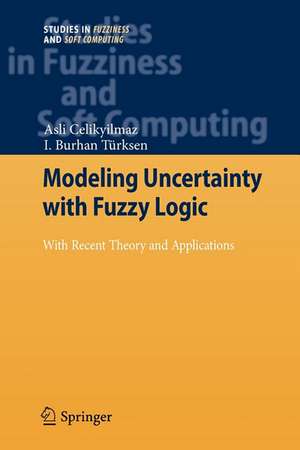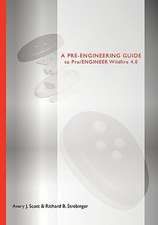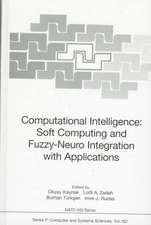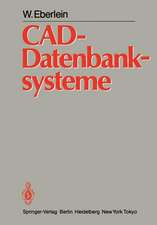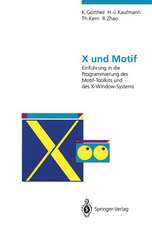Modeling Uncertainty with Fuzzy Logic: With Recent Theory and Applications: Studies in Fuzziness and Soft Computing, cartea 240
Autor Asli Celikyilmaz, I. Burhan Türksenen Limba Engleză Paperback – 21 oct 2010
| Toate formatele și edițiile | Preț | Express |
|---|---|---|
| Paperback (1) | 994.58 lei 6-8 săpt. | |
| Springer Berlin, Heidelberg – 21 oct 2010 | 994.58 lei 6-8 săpt. | |
| Hardback (1) | 1001.16 lei 6-8 săpt. | |
| Springer Berlin, Heidelberg – 8 apr 2009 | 1001.16 lei 6-8 săpt. |
Din seria Studies in Fuzziness and Soft Computing
- 20%
 Preț: 999.85 lei
Preț: 999.85 lei - 20%
 Preț: 653.06 lei
Preț: 653.06 lei - 20%
 Preț: 872.96 lei
Preț: 872.96 lei - 20%
 Preț: 930.57 lei
Preț: 930.57 lei - 20%
 Preț: 1051.00 lei
Preț: 1051.00 lei - 20%
 Preț: 992.44 lei
Preț: 992.44 lei - 20%
 Preț: 655.85 lei
Preț: 655.85 lei - 20%
 Preț: 1001.86 lei
Preț: 1001.86 lei - 18%
 Preț: 954.14 lei
Preț: 954.14 lei - 20%
 Preț: 330.10 lei
Preț: 330.10 lei - 20%
 Preț: 333.04 lei
Preț: 333.04 lei - 20%
 Preț: 997.56 lei
Preț: 997.56 lei -
 Preț: 391.61 lei
Preț: 391.61 lei - 20%
 Preț: 647.79 lei
Preț: 647.79 lei - 20%
 Preț: 986.01 lei
Preț: 986.01 lei - 18%
 Preț: 958.56 lei
Preț: 958.56 lei - 20%
 Preț: 996.40 lei
Preț: 996.40 lei - 20%
 Preț: 999.35 lei
Preț: 999.35 lei - 15%
 Preț: 646.43 lei
Preț: 646.43 lei - 20%
 Preț: 651.57 lei
Preț: 651.57 lei - 20%
 Preț: 997.89 lei
Preț: 997.89 lei - 15%
 Preț: 641.03 lei
Preț: 641.03 lei - 20%
 Preț: 1009.74 lei
Preț: 1009.74 lei - 20%
 Preț: 992.62 lei
Preț: 992.62 lei -
 Preț: 388.72 lei
Preț: 388.72 lei - 18%
 Preț: 1223.43 lei
Preț: 1223.43 lei - 20%
 Preț: 651.42 lei
Preț: 651.42 lei - 18%
 Preț: 951.59 lei
Preț: 951.59 lei - 18%
 Preț: 948.61 lei
Preț: 948.61 lei
Preț: 994.58 lei
Preț vechi: 1243.23 lei
-20% Nou
Puncte Express: 1492
Preț estimativ în valută:
190.31€ • 198.31$ • 157.58£
190.31€ • 198.31$ • 157.58£
Carte tipărită la comandă
Livrare economică 03-17 aprilie
Preluare comenzi: 021 569.72.76
Specificații
ISBN-13: 9783642100635
ISBN-10: 3642100635
Pagini: 448
Ilustrații: XLVIII, 400 p.
Dimensiuni: 155 x 235 x 24 mm
Greutate: 0.63 kg
Ediția:Softcover reprint of hardcover 1st ed. 2009
Editura: Springer Berlin, Heidelberg
Colecția Springer
Seria Studies in Fuzziness and Soft Computing
Locul publicării:Berlin, Heidelberg, Germany
ISBN-10: 3642100635
Pagini: 448
Ilustrații: XLVIII, 400 p.
Dimensiuni: 155 x 235 x 24 mm
Greutate: 0.63 kg
Ediția:Softcover reprint of hardcover 1st ed. 2009
Editura: Springer Berlin, Heidelberg
Colecția Springer
Seria Studies in Fuzziness and Soft Computing
Locul publicării:Berlin, Heidelberg, Germany
Public țintă
ResearchCuprins
Fuzzy Sets and Systems.- Improved Fuzzy Clustering.- Fuzzy Functions Approach.- Modeling Uncertainty with Improved Fuzzy Functions.- Experiments.- Conclusions and Future Work.
Recenzii
From the reviews:“The present book has as goal the representation and utilization of uncertainty by means of fuzzy functions. … The book begins with a very good overview of the basic notions and principles related to fuzzy sets and systems … . The fuzzy models proposed in this book can be used with success by researchers from various domains of activity: engineering, economics, biology, sociology etc., in order to model complex systems.” (Ion Iancu, Zentralblatt MATH, Vol. 1168, 2009)
Textul de pe ultima copertă
The objective of this book is to present an uncertainty modeling approach using a new type of fuzzy system model via "Fuzzy Functions". Since most researchers on fuzzy systems are more familiar with the standard fuzzy rule bases and their inference system structures, many standard tools of fuzzy system modeling approaches are reviewed to demonstrate the novelty of the structurally different fuzzy functions, before we introduced the new methodologies. To make the discussions more accessible, no special fuzzy logic and system modeling knowledge is assumed. Therefore, the book itself may be a reference for some related methodologies to most researchers on fuzzy systems analyses. For those readers, who have knowledge of essential fuzzy theories, Chapter 1, 2 should be treated as a review material. Advanced readers ought to be able to read chapters 3, 4 and 5 directly, where proposed methods are presented. Chapter 6 demonstrates experiments conducted on various datasets.
Caracteristici
Introduces the formation of type-2 fuzzy functions to capture uncertainties associated with system behaviour Presents an uncertainty modeling approach using a new type of fuzzy system model via “Fuzzy Functions”
